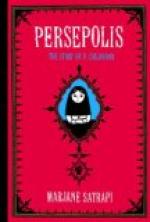“For I am sick, and capable
of fears,—
Oppressed with wrong, and,
therefore, full of fears;
A widow, husbandless, subject
to fears;
A woman, naturally born to
fears.”
“If thou, that bidst me be
content, wert grim,
Ugly, and slanderous to thy
mother’s womb,—
Lame, foolish, crooked, swart,
prodigious—”
Or, drawing herself up “to the height of her great argument,”—
“I will instruct my sorrows
to be proud,
For grief is proud, and makes
his owner stout.
Here I and sorrow sit.”
Scott used to say that he was amazed at her power over him, saying to Mrs. Keith, “She’s the most extraordinary creature I ever met with, and her repeating of Shakespeare overpowers me as nothing else does.”
Thanks to the little book whose title heads this paper, and thanks still more to the unforgetting sister of this dear child, who has much of the sensibility and fun of her who has been in her small grave these fifty and more years, we have now before us the letters and journals of Pet Marjorie: before us lies and gleams her rich brown hair, bright and sunny as if yesterday’s, with the words on the paper, “Cut out in her last illness,” and two pictures of her by her beloved Isabella, whom she worshipped; there are the faded old scraps of paper, hoarded still, over which her warm breath and her warm little heart had poured themselves; there is the old watermark, “Lingard, 1808.” The two portraits are very like each other, but plainly done at different times; it is a chubby, healthy face, deep-set, brooding eyes, as eager to tell what is going on within as to gather in all the glories from without; quick with the wonder and the pride of life: they are eyes that would not be soon satisfied with seeing; eyes that would devour their object, and yet childlike and fearless; and that is a mouth that will not be soon satisfied with love; it has a curious likeness to Scott’s own, which has always appeared to us his sweetest, most mobile, and speaking feature.
There she is, looking straight at us as she did at him,—fearless, and full of love, passionate, wild, wilful, fancy’s child. One cannot look at it without thinking of Wordsworth’s lines on poor Hartley Coleridge:—
“O blessed vision, happy child!
Thou art so exquisitely wild,
I thought of thee with many
fears,—
Of what might be thy lot in
future years.
I thought of times when Pain
might be thy guest,
Lord of thy house and hospitality;
And Grief, uneasy lover! ne’er
at rest
But when she sat within the
touch of thee.
O too industrious folly!
O vain and causeless melancholy!
Nature will either end thee
quite,
Or, lengthening out thy season
of delight,
Preserve for thee, by individual
right,
A young lamb’s heart
among the full-grown flock.”
And we can imagine Scott, when holding his warm, plump little playfellow in his arms, repeating that stately friend’s lines:—




